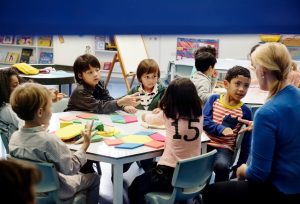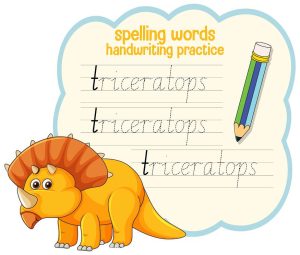Rhyme Time: Explore the Magical Journey of Elevating Learning with Rhyming Words

Have you ever played with words that sound the same? It’s called rhyming, and it’s lots of fun! Rhyming words are like twin pairs in the word family. They have the same sound at the end and this makes them cool to say together. But along with being fun they also act as linguistic building blocks for children. They help in understanding the sounds, aid in vocabulary acquisition, and language development, and improve literacy skills. So, let’s start this rhyming adventure.
Benefits of Learning Rhyming Words for Children
Below are the certain things in which the knowledge of rhyming words can help:
- Increases Language Skills: It increases children’s awareness about the sounds and patterns of language and helps them to learn how words fit together.
- Builds Vocabulary: It’s like a buy 1 get 2 deal, where children learn multiple words at once.
- Boosts Phonemic Awareness: Rhyming words help children to hear, identify, and manipulate individual sounds of words.
- Enhances Creativity: Learning rhyming words allows kids to play with language, and spark the fire of imagination, to create dreamy rhymes and songs.
- Increases Reading and Learning Skills: As it helps recognize similar sounds, it becomes easy for them to strengthen their reading skills.
Roadmap of Stages in Rhyming Words Learning Journey
It’s a fun-filled journey, allow your child to take pleasure in each step for better learning:
- Recognition: It is the preliminary step. Read the rhymes, songs, and stories to your child and ask them to concentrate and categorize them based on one-of-a-kind sounds.
- Matching: As they become familiar with sounds, subsequently ask them to identify the pairs of words that rhyme collectively.
- Generating: Once they become tailored to recognizing rhyming pairs, ask them to generate rhyming words with comparable sounds.
- Application: Finally, ask them to apply their know-how of rhymes to reading and writing activities, like speech, storytelling, poems, and many others.
Methods to Introduce Rhyming Words to Kids
Here’s how through their day-to-day routine you can familiarize them with the concept of rhyming words:
- Rhyming Poems: You can start by singing rhyming songs together like Twinkle, Twinkle, and Old MacDonald that are filled with easy rhyming words. It helps them identify sounds and memories of rhyming words.
- Rhyme Games: You can twist their daily games to help them learn rhymes. Like ‘I Spy’ but with rhymes, you can say something like cat then they have to say rhyming words.
- Rhyme Books: Read rhyme books aloud to your child and encourage them to join and identify the words as you proceed ahead.
- Rhyme Snack: Play this game during their snack time by asking them to rhyme words with food items. Like for a carrot, it’s a parrot.
- Leverage Technology: Use can use rhyming apps, online rhyming games, rhyme videos, interactive e-books, virtual rhyme challenges, and others to incorporate technology into the learning process.
Fun and Easy Rhyming Games for Kids
Here are some of the games that can be both educational and fun:
- Rhyming Bingo: Make bingo cards with rhyming words. Call out a word. Ask them to cut out the word with a similar sound.
- Rhyming Relay: You can play this fun and engaging game, where each participant has to say a word that rhymes with the previous word said.
- Rhyming Treasure Hunt: Hide certain objects in the house that rhyme with each other and ask the children to hunt them around the house, and create pairs.
- Rhyming Tic-Tac-Toe: Use sounds like -at, ad, -ine, etc., instead of X and 0. Asks them to complete the game by writing words.
- Rhyming Sorting: Mix different rhyming words for kindergarten in a basket. Ask them to sort these words according to their rhyming sounds.
- Rhyme Storytelling: Challenge your kid to make a story with as many rhyming words as they can.
Rhyming Words Examples
Examples of Rhyming Words
Here’s a table that covers a variety of rhyming words list for kids:
|
Sound |
Rhyming Words |
|
-at |
Rat, Sat, Pat, Fat |
|
-og |
Jog, Fog, Blog, Smog |
|
-un |
Gun, Nun, Run, Spun |
|
-oon |
Moon, Noon, Lagoon, Raccoon |
|
-ake |
Cake, Fake, Take, Wake |
|
-ook |
Book, Took, Nook, Cook |
|
-ish |
Fish, Dish, Wish, Swish |
|
-ee |
Bee, See, Free, Tree |
|
-ain |
Gain, Main, Brain, Grain |
|
-ight |
Night, Might, Tight, Height |
|
-ar |
Car, Scar, Jar, Far |
|
-uck |
Duck, Yuck, Buck, Luck |
|
-ox |
Ox, Fox, Box, Pox |
|
-oy |
Toy, Boy, Soy, Roy |
|
-en |
Ten, Pen, Hen, Men |
|
-ap |
Cap, Map, Nap, Tap |
|
-in |
Pin, Bin, Sin, Fin |
|
-it |
Sit, Hit, Fit, Lit |
|
-ad |
Had, Dad, Sad, Mad |
|
-ickle |
Pickle, Fickle, Sickle |
Examples of Rhyming sentences
- Imagine that, a cat sat on a hat.
- Under the light of the moon, we eat by spoon.
- Oh boy! Playing with a toy brings so much joy.
- Run, run, run, under the sun, we have so much fun.
- Take a look at the book.
- Turn on the light, it’s night.
- My wish is to see a fish on the dish.
- What a luck! I got a duck and a truck.
- Let’s make a cake because it’s time to bake.
Examples of Rhyming Poems
The Jumping Frog, Twinkle Twinkle Little Star, The Curious Mouse, The Friendly Bee, The Silly Cat. These are examples of some poems that contain preschool rhyming words.
So now, we have come to the end of this rhyming journey. Through this blog, we’ve learned about rhyming words, their benefits, and examples. These rhyming words help children expand their language abilities. So, start today and engage your young ones in these fun and engaging games and motivate them to delve into the knowledge of the rhyming world. Keep rhyming and share the wonder of knowledge with your kid. Let’s also rhyme with success. For this, explore the innovative and fun-filled environment at Billabong High International School. Enrol now, to provide your child with an exciting and best start in their life, to touch the mountain of success.








